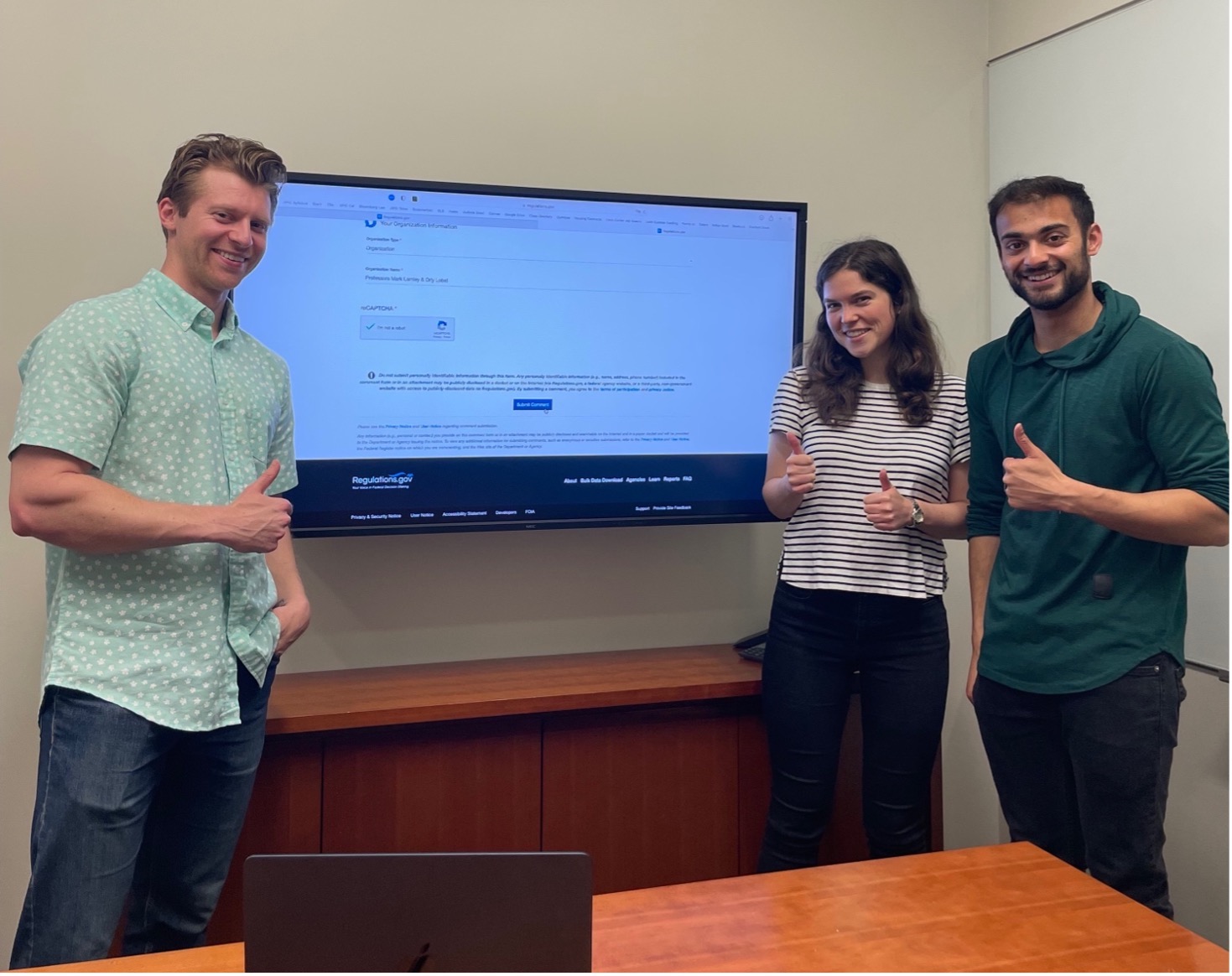 (AGENPARL) - Roma, 29 Aprile 2023
(AGENPARL) - Roma, 29 Aprile 2023(AGENPARL) – STANFORD (CA) sab 29 aprile 2023
Juelsgaard Intellectual Property and Innovation Clinic students Seraj Desai (JD ’24), Tanner Kuenneth (JD ’23), and Julia Laurence (JD ’24) recently submitted a comment to the Federal Trade Commission supporting the agency’s proposed ban on non-compete clauses (noncompetes) in employment contracts. The Clinic filed the comment on behalf of Stanford Law School Professor Mark A. Lemley and University of San Diego School of Law Professor Orly Lobel, distinguished scholars of intellectual property, innovation, and competition law.

Noncompetes affect 30 million American workers nationwide. From C-suite executives to hairdressers and fast food workers, employees from many different backgrounds are bound by noncompetes. Depending on the particular state’s law, these agreements can prevent employees from joining a competitor or even starting their own competing businesses in the same region. In some states, these restrictions can last up to a decade.
In January, the Federal Trade Commission (FTC)—an agency tasked to create rules and regulations for addressing “unfair methods of competition”—proposed a new rule to ban noncompetes between employers and employees. Like other agencies, the FTC must first issue a “Notice of Proposed Rulemaking,” which allows anyone to submit their thoughts on the proposed rule. The Clinic teamed up with Professors Lemley and Lobel to submit a comment in support of the FTC’s ban on noncompetes. The Clinic’s comment argues that the ban is a major step toward addressing three harmful effects of noncompetes: reduced innovation, depressed wages, and decreased workplace equality.


First, the comment describes how noncompetes reduce entrepreneurship and innovation. Noncompetes prevent an employee from joining a competitor or spinning off their own within their own within-industry startup. Both the Bay Area and Boston were well positioned in the 1970s to become “Silicon Valley,” but the Bay Area won out in part because California banned noncompetes, unlike Massachusetts. Today, California’s noncompete ban has continued to help the state flourish. Google alumni, for example, have gone on to found thousands of startups, raising billions of dollars of investment per year, which might not have been possible had California enforced noncompetes.
Second, the comment explains how the FTC’s ban on noncompetes would raise wages. Professor Lobel’s research identifies four distinct mechanisms that can lead to higher wages in the absence of noncompetes: (1) increased employee bargaining power; (2) more positive-incentive retention structures; (3) increased employee productivity from better employer-employee matching; and (4) increased employee talent from more frequent knowledge spillovers. Each effect places upward pressure on wages.
Third, the FTC’s ban on noncompetes promotes workplace equality, particularly for women. Studies show that noncompetes target women not only more frequently but also more potently, because women often cannot relocate outside the geographic reach of the noncompete as easily as men can. By limiting what kinds of employers a worker can seek out next, noncompetes can end up entrenching women and minorities in discriminatory work environments.

The Clinic’s comment also argues that other kinds of restrictive agreements that have similar harmful effects should still fall under the FTC’s proposed ban, even if they are not facially titled “noncompetes.” For example, overbroad non-disclosure agreements, non-solicitation agreements, non-dealing agreements, and non-poaching agreements can all function as noncompetes. The FTC‘s current proposed rule would reach “de facto” noncompetes, and the Clinic’s comment elaborates on why that position is necessary.
Finally, the Clinic’s comment explains why states cannot solve these problems on their own—or put another way, why federal action is necessary. Only three U.S. states (California, Oklahoma, and North Dakota) have fully banned noncompetes. The other 47 states have adopted ambiguous “reasonableness” tests. And even within the states that have banned noncompetes, each adopts its own unique exceptions. This patchwork of state law is increasingly incompatible with our national labor market and economy, and it’s created a collective action problem among the states. A uniform federal policy by the FTC, on the other hand, would create a clear, nationwide baseline for all U.S. employers and employees.
The FTC’s proposed action to ban noncompetes has garnered national attention, particularly among labor and business groups. How the rule plays out—both at the FTC and in federal courts if the rule is challenged—will have a major impact on the economy, competition policy, and national innovation.
Fonte/Source: https://law.stanford.edu/2023/04/28/juelsgaard-clinic-supports-ftc-proposed-ban-on-noncompete-agreements-as-good-for-labor-mobility-competition-and-innovation/
